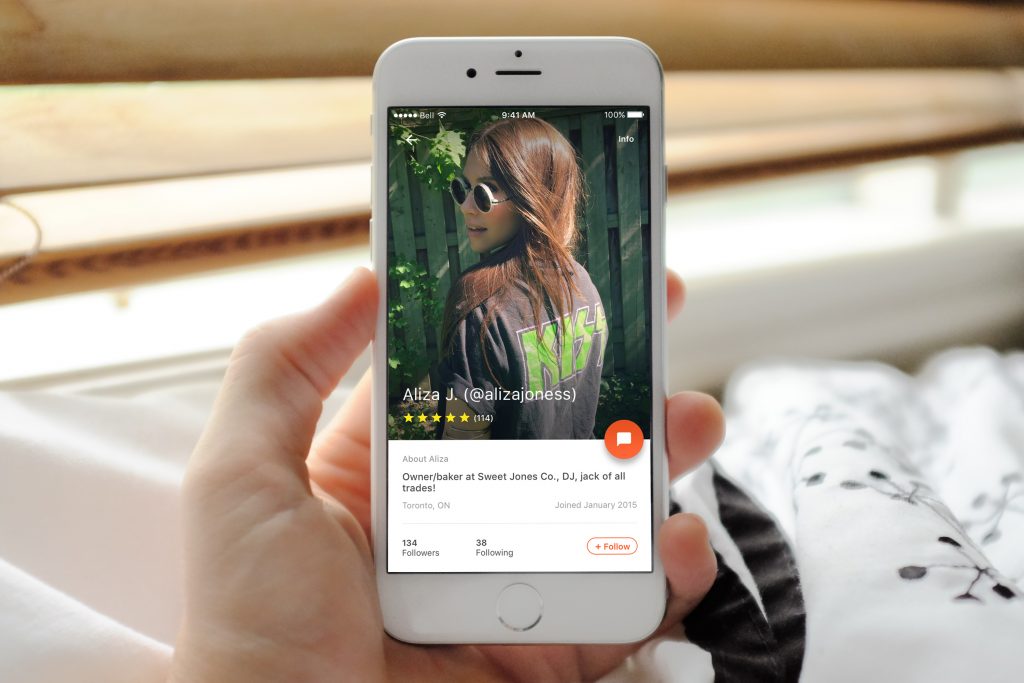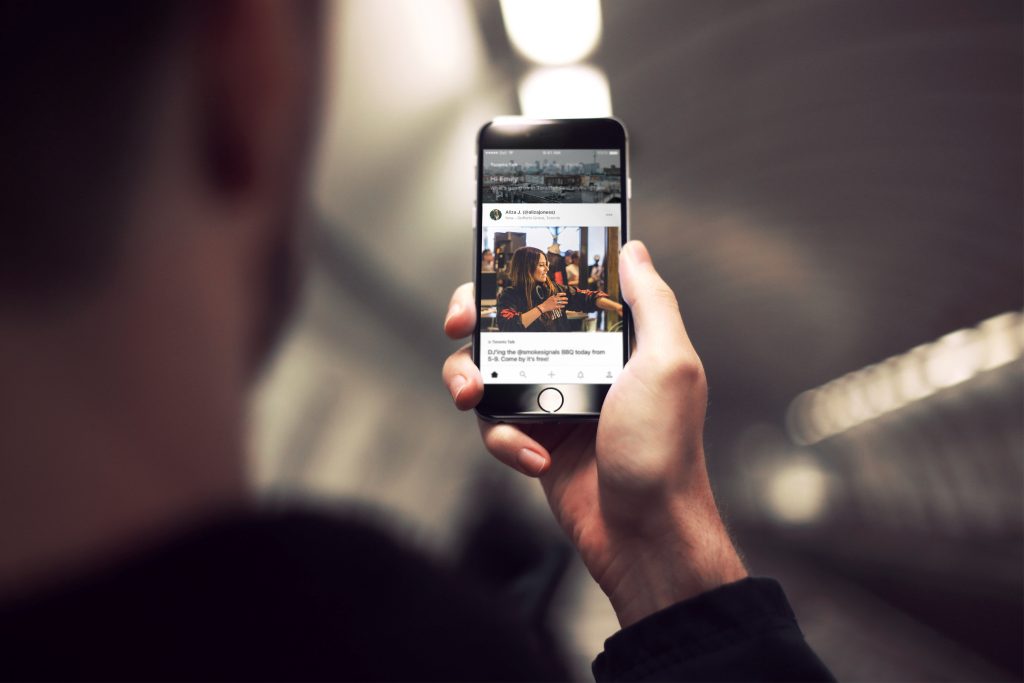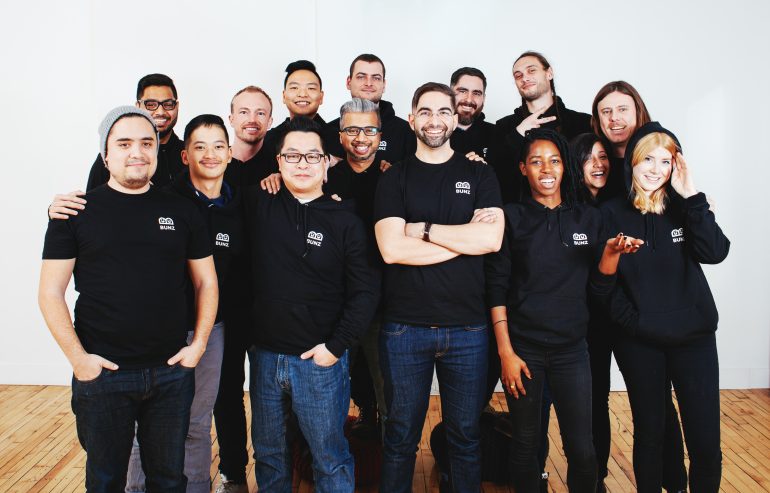They say necessity is the mother of invention, and for Bunz founder Emily Bitze, the story is no different. After struggling to live on next to nothing after graduating school and having a tough time in the job market as a musician and artist, Bitze noticed a common thread: her friends all had things they didn’t need and, even in her financial struggles, so did she.
Bitze launched Bunz (originally called ‘Bumz Trading Zone’) as a money-free trading zone within her own friend circle in 2013. Since then, the group has grown to 120,000 community members, and recently launched its own app and rebranded with marketing agency Cossette.
“Working with Bunz is an exciting opportunity for us to further our commitment to the startup community,” said Carlos Moreno, chief creative officer of Cossette. “Not only are we helping to
implement a bold new idea into the marketplace, our people get to team up with the innovative
thinkers and entrepreneurs of one of Canada’s most up-and-coming startups.”
Bunz has grown from a Facebook community with a few hundred members into a veritable force in the trend of hyper-local engagement through technology. As the world gets smaller and smaller, Bitze and team believe that the power of individual communities will take over our globalized world.
Solving her own problem
“I was struggling financially; I couldn’t afford to get some of the most basic things in life,” recounts Bitze, who described not being able to afford things like furniture for her apartment or food.
“I had friends in a similar situation, and we were all living close to one another. So I thought it would make sense to exchange things [amongst ourselves and with others]. There’s a good chance somebody else might find something that you don’t want very useful.”
When it came to organizing her newfound community idea, Facebook immediately came to mind as the “easiest way to organize this kind of community, at the time.” The community quickly grew – from a few hundred, to ten thousand, to now over sixty thousand.
But with scale comes its own challenges.
“Once you get to a certain size, Facebook’s algorithm takes over and re-orders posts for you. It also only notifies you when a friend of yours posts, which takes away the idea of finding something from someone you may not know,” said Sarena Ally, Bunz’s marketing director.
“There were also limitations to what you can do with a Facebook group,” says Bitze. She noted that as the group got to a critical mass, it became near impossible to search for specific people, specific things, or tag something else you found interesting.
“I really didn’t want Bunz to die, but Facebook was not built to facilitate this kind of community.”
App-building through IRL communities
“I come from an arts background…so when people would suggest I build an app, it was very far away from what I know,” says Bitze.
But Bunz works in mysterious ways.
During a Bunz In-Real-Life (IRL) trading meetup in Toronto, Bitze was taking care of the Bunz table and decided to put a tip jar labelled “Donations for the Bunz app.” Laughing about it now, she recalls that the only money that made it into the jar was the $5 she put in there to get it going. But instead of collecting a lot of money, she ran into Chris Barless, a developer who was attending the meetup with his sister, Lauren Barless, a designer. Chris was curious about the app idea and what could become of it, so he joined the team and they started to brainstorm features and roll out dates.

Their first attempt at developing app failed, though not for negative reasons – Bitze had started touring as a musician and both Chris and Lauren had good jobs they needed to focus on. Still, Bitze wanted to see Bunz grow and was committed to building an app.
The second time, it worked.
Bitze was approached by a small team of developers working on a similar idea to Bunz – a Tinder-style app for trading where you swiped left or right on products you wanted to barter for. If the other person swiped on your products available for barter as well, you’d be matched so you could connect and trade. They wanted to work with Bitze because they had the technology, but Bunz had the community.
“We talked about it for months,” Bitze remembers. “I was worried about compromising the community.” After many conversations, and with Bitze fighting for what she calls the ‘purity’ of the community, the app was underway and they launched their first version.
They even brought Chris, the original developer whom Bitze met in Toronto, onto the team that has remained to this day.
Growing pains
One of the first challenges for Bunz in the transition from Facebook to app is ensuring they don’t lose their global scale – but also that they first figure out just how global their scale really is.
Ally, Bunz’s marketing director, notes that there are over 120,000 members on the Bunz app, but that there are “probably 80,000 more members in Bunz-branded groups around the world.” This is because numerous city organizers had contacted Bunz in the past, loving the brand message and wanting to bring Bunz to their local community. This has been great for near viral growth of the community, but difficult to track and transition from Facebook to app.
When it comes to growth, Emily Bitze is adamant that any revenue channels stay true to the mission of Bunz: helping people get what they need from neighbours.
Both Ally and Bitze note that many members are in small communities where they joined Bunz on Facebook but perhaps the app itself is not big enough in their specific area yet to provide value. As well, a volunteer-led expansion team left little room for strategic expansion. Since getting angel funding, the team has looked to remedy this with purposeful US expansion into NYC and Austin, TX. By making the choice to launch in these two cities through Bunz HQ, Bunz retains more control and can curate the experience.
Finally, as with any growing startup, Bunz is working to find its place in the marketplace world. They count established players like Craigslist and Kijiji as potential competitors and note that huge startups such as VarageSale are also playing in a similar space to them.
Money, politics, and sex
Bunz, to date, has one anonymous angel investor, “who supports our mission and sees our vision,” says Ally. This angel funding has allowed Bunz – known for their “no money in the zone” mantra – to stay afloat and grow, building up their team while they look for ways to monetize.
This is an organic move for a community founded on bartering that grew to its members promoting housing and services
As Bunz expands, though, herrings from the past rear their occasionally ugly heads. The Bunz community started as a barter-zone only, meaning that content was limited to products that people were trying to barter. Since the growth of the community, many Facebook Bunz-zones started to develop their own rules and community boundaries, notes Eli Klein, PR Manager for Bunz.
With each community setting their own guidelines, things like radical or hateful political posts, or offering sexual favours for barter, crept onto the platform. It’s an interesting point for the Bunz team, as they want to support the community but also ensure that they are protecting everyone involved.
This also presents a unique challenge for Bunz, whose founding team is vehement that the community remain open to all and a place that does not impose its morality onto others. Instead, they focus on practicality – you are not allowed to offer anything illegal for barter on Bunz. This whole situation is far less of an issue on their own app, as they are able to set their own community standards and it is clear what is and is not allowed.
Betting big on local
With the Bunz brand growing and more community members joining on Facebook or downloading the app, Bitze has her sights on what’s next: Bunz Experiences.

“[Experiences help you] find things [to do] in the city you live in,” she explains. Digging back into her own past and her reasons for founding Bunz, she knows that people in her circumstances at the time didn’t just need an opportunity to barter…they also needed opportunities to be entrepreneurial and make money.
So while an Airbnb experience might feature a guided tour for travelers of a local museum by a particularly history-buffed Airbnb host, a Bunz experience might be something you could do on a date; moonlight yoga, graffiti tours of the city, or cooking classes. I noted that travelers could also love these types of Experiences, but Ally and Bitze say the original Bunz Experiences will be marketed to the local community.
For Bitze, this is an organic move for a community founded on bartering that grew to its members promoting housing and services. Now, moving onward to Experiences, the community gets to showcase their unique talents – with an opportunity to make money attached.
This is also where Bunz sees their golden opportunity, thinking of how Bunz can take a small service fee for facilitating Experiences, or have a paid premium-post model where users can have their posts show up at the top of the list.
When it comes to growth, however, Bitze remained adamant that any revenue channels stay true to the mission of Bunz: helping people get what they need from their neighbours. This means ensuring that any charges are fair, transparent, and linked to specific value for the user, not a pay-to-play model — or, worse, an entrance fee.


